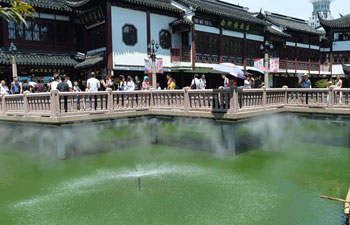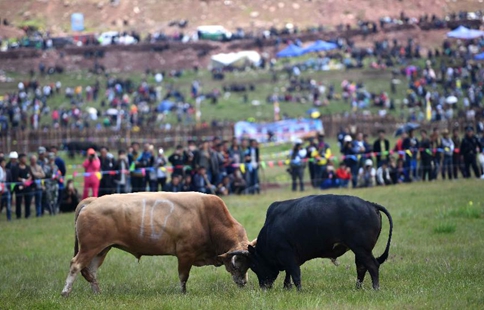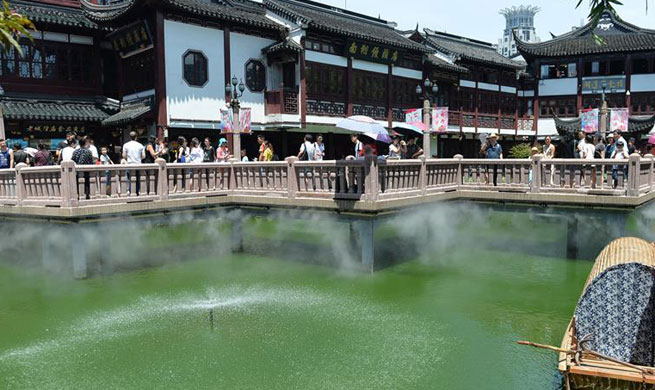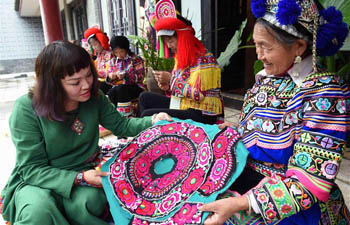FUZHOU, July 18 (Xinhua) -- It finally happened: wild grass can now be turned into nutritious and delicious mushrooms. No, it is not witchcraft, but modern agricultural technology, bringing cash and dignity to poor farmers in China and beyond.
The technology enables edible and medicinal fungi to grow out of chopped grass or herbal plants, in a similar way that some fungi grow from trees. The herbaceous herbs are called "Juncao."
The idea was the brainchild of Lin Zhanxi, 75, a professor with Fujian Agriculture and Forestry University, who came up with the technique more than 30 years ago.
The Juncao Technology Project was launched at the UN headquarters in May and has been supported by China-UN Peace and Development Trust Fund. The project will help developing countries prevent soil and water loss, while combating poverty and malnutrition.
FROM LAB TO FARM
Lin's journey researching Juncao started in the spring of 1983 when he visited Changting county in eastern China's Fujian Province.
He was shocked by what he saw -- excessive deforestation, water and soil losses and poor people.
Lin remembers it like it was yesterday. A biting cold wind swept through the cracked walls of a simple adobe house as a family huddled for warmth.
"Uncle Lin, I'm so hungry. Could you give me some sweet potato chips to eat?" a child asked.
Lin could not sleep that night. "Surely, there must be a way to save these poor people and their environment?" he asked himself.
An idea suddenly struck him, "What if wild grass could somehow be harnessed for food?"
Returning to university, he started researching growing edible mushrooms from grass. Traditionally, mushrooms were cultivated in sawdust, which meant cutting down many trees, damaging the environment.
After three years of arduous research not to mention lots of innovation, Lin saw the world's first Juncao mushroom sprout from a bottle filled with forked fern and other ingredients.
However, encouraging farmers to use the new mushroom-growing technology was not going to be easy.
In Youxi county in 1988, Lin broke his ribs in a traffic accident, but he left hospital only four days after surgery to convince 27 local households to pilot his new technology.
The residents, like most people, had no idea that mushrooms could be cultivated from wild grass. Many thought Lin was nothing more than a fraud and a cheat.
"I promised that I would compensate them if they lost money," Lin said. "If Youxi county, which boasted rich forest, could grow mushrooms from grass, other places would follow suit."
The Youxi trial was a success. By 1995, the number of households participating Lin's project had increased from 27 to more than 4,200.
THE MUSHROOM EFFECT
China has 400 million hectares of grassland, nearly three times the area of arable land, according to Lin
By using just three percent of grassland, the Juncao industry could generate more than 135 million tonnes of mushrooms and create tens of millions of jobs.
In China's Ningxia Hui Autonomous Region, Lin's project has helped lift 17,500 households from poverty. The annual income of the local farmers increased from 80 U.S. dollars in 1998 to 1,024 dollars in 2007.
While encouraging the growth of Juncao domestically, Lin and his team have been working hard to extend it abroad since the 1990s.
China has offered training on Juncao technology to more than 6,000 people across the world and established Juncao training and production bases in eight countries, such as Thailand, Malaysia and Fiji, helping them increase farmers'income, while creating social and environmental benefits.
With technical assistance from China, Juncao has helped prevent water and soil loss in Rwanda, fight poverty in South Africa and boost animal farming in Fiji.
Lin's team has cultivated more than 50 edible and medicinal fungi, like the King Trumpet Mushroom and Wood Ear Mushroom, by using different kinds of grass.
"Hopefully, the mushroom-growing technology created by Chinese researchers can play a more positive role in the global fight against poverty and ecological degradation," Lin said.
Despite his old age, Lin never stops. He plans to establish another eight Juncao production and training bases in developing countries within the next two years.
Next month, he will go to Papua New Guinea to teach more farmers how to turn wild grass into mushroom gold.

















